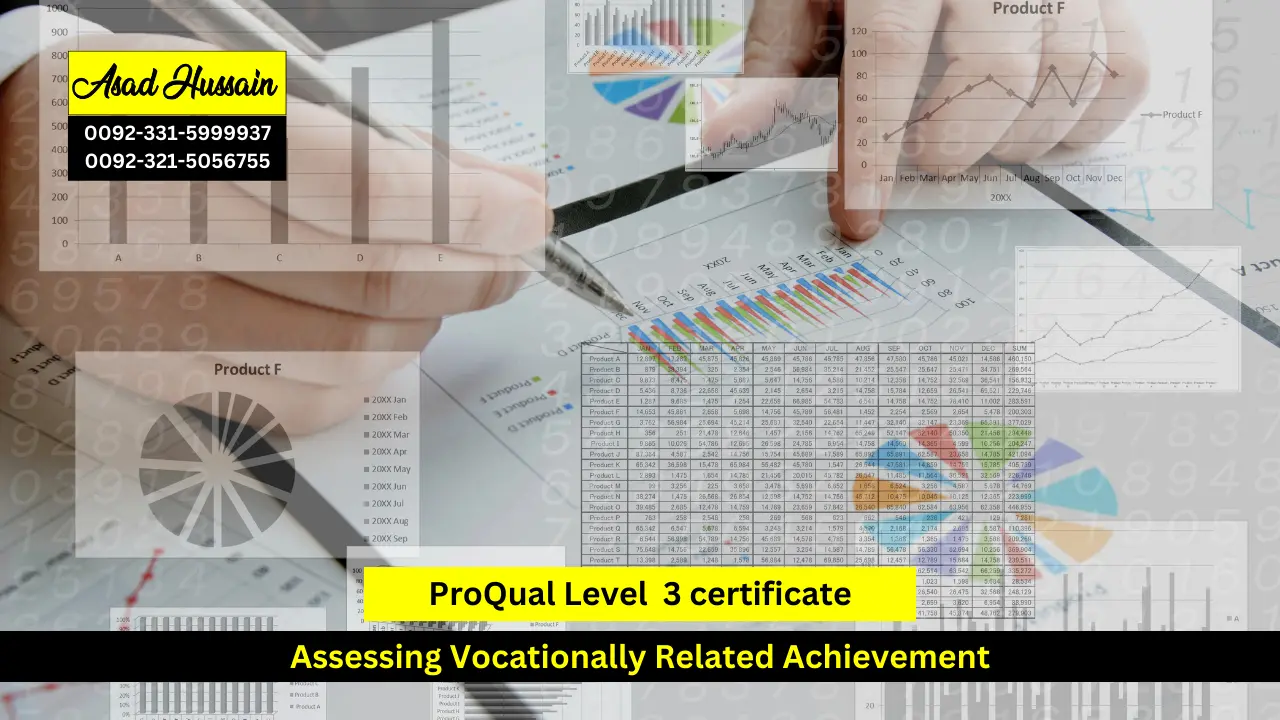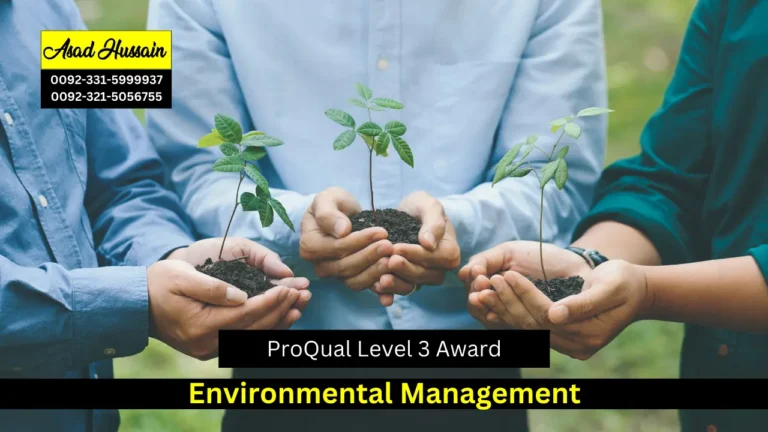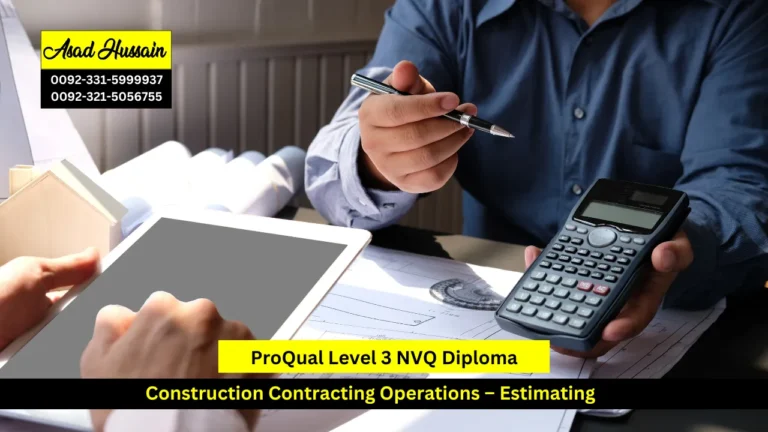The ProQual Level 3 Certificate in Assessing Vocational Achievement is a comprehensive assessment qualification designed for individuals responsible for evaluating competence and knowledge within vocational settings. This nationally recognised programme equips learners with the principles and practices of assessment, including planning assessment activities, making judgements against agreed standards, and providing constructive feedback to candidates. The curriculum covers key areas such as understanding different assessment methods, involving learners in the assessment process, and maintaining quality assurance throughout the assessment cycle. Successful completion confirms that an individual possesses the expertise to assess both occupational competence in the workplace and vocational knowledge in classroom or training environments.
This qualification places strong emphasis on developing the professional judgement and ethical integrity required of a competent assessor. Participants will explore topics including standardisation practices, record-keeping requirements, and the management of appeals and disputes. The content is designed to build confidence in making valid, reliable, and fair assessment decisions while supporting diverse learners with varying needs and backgrounds. Assessment is conducted through portfolio building, allowing candidates to demonstrate their competence through real assessment activities, observation reports, and reflective accounts that capture their development as assessment practitioners.
The ProQual Level 3 Certificate in Assessing Vocational Achievement is the definitive qualification for those wishing to specialise in vocational assessment roles. Upon achievement, learners may choose to pursue further certifications in internal quality assurance or external quality assurance, as well as advanced diplomas that explore centre management and lead verifier responsibilities. This qualification stands alone as the gold standard for assessor practice, opening doors to roles within further education colleges, private training providers, and employer-led academies while ensuring that assessment decisions consistently meet the highest professional standards across all vocational sectors.
Program Highlights
Level 3 Certificate in Assessing Vocational Achievement consists of 3 mandatory units having 84 GLH and 150 Hours TQT. Candidates must complete all of the following Mandatory units.
Mandatory Units
| Sr# | Unit Title | Unit Level | GLH |
|---|---|---|---|
| 1 | Understanding the principles and practices of assessment | 3 | 24 |
| 2 | Assess occupational competence in the work environment | 3 | 30 |
| 3 | Assess vocational skills, knowledge and understanding | 3 | 30 |
Entry Requirements
The entry requirements for this qualification are designed to ensure that learners possess the necessary foundation, maturity, and vocational credibility to undertake the responsibilities of an assessor and successfully complete the assessment activities required within the programme.
- Age Requirements: Learners must be at least 19 years of age. This minimum age reflects the level of professional maturity, occupational experience, and judgement required to make valid and reliable assessment decisions that impact learners and organisational standards.
- Educational Background: Learners should hold a relevant vocational qualification at or above the level they wish to assess. This may include diplomas or certificates in their occupational specialism, such as Level 3 Diplomas in Health and Social Care, Business Administration, Customer Service, Hairdressing, Construction, or Engineering. Related teaching or training certifications, such as the Level 3 Award in Education and Training, also provide a useful foundation for this assessing qualification.
- Language Proficiency: Learners must possess a strong command of written and spoken English, as the role requires clear communication of assessment feedback, completion of detailed assessment records, and interpretation of qualification standards. A minimum equivalent to GCSE grade C/4 in English is strongly recommended.
- Work experience: is an essential requirement for this qualification. Learners must have access to at least two candidates working within their own vocational area and be able to assess them in a real work environment. This necessitates current occupational competence and sufficient industry experience to make credible judgements against national occupational standards. Learners are also required to assess vocational skills, knowledge, and understanding in both workplace and non-workplace settings.
These entry criteria ensure that every learner embarking upon this qualification possesses the vocational credibility and professional readiness required to become a competent and confident assessor. Whether you already hold related teaching diplomas, advanced vocational certificates, or extensive industry experience, this programme demands a genuine commitment to upholding assessment standards and supporting others to achieve their full potential. It is designed for experienced practitioners ready to step into the rewarding role of guiding and judging the competence of others within their chosen professional field.
Learning Outcomes
By completing the Level 3 Certificate in Assessing Vocational Achievement, learners will be able to
- Understand the principles and practices of vocational assessment, including the different types of assessment methods and their purposes.
- Plan and prepare for vocational assessment, including identifying the requirements of the qualification being assessed and the needs of the learner.
- Carry out vocational assessment, including selecting appropriate assessment methods, making assessment decisions, and providing feedback to the learner.
- Understand the principles of quality assurance in vocational assessment, including the importance of standardization, feedback, and continuous improvement.
- Understand the legal and ethical considerations in vocational assessment, including the requirements of regulatory bodies and the responsibilities of assessors.
- Develop effective communication and interpersonal skills to build positive relationships with learners, colleagues, and other stakeholders.
- Apply theoretical knowledge and practical skills to carry out assessments in a fair, reliable, and valid manner.
Reflect on their own assessment practice and identify areas for improvement, and take action to enhance their professional development. - Use technology to support vocational assessment, including online tools and e-portfolios.
- Understand the requirements of vocational qualifications and standards, and how to use them to plan and carry out assessments.
Target Audiences
The ProQual Level 3 Certificate in Assessing Vocational Achievement is designed for experienced occupational practitioners who wish to formally qualify as competent assessors within their vocational specialism. This comprehensive qualification is intended for individuals who are already working in or preparing to move into roles that require them to assess both competence in the workplace and knowledge in classroom or training environments. It is suitable for those who take pride in their professional expertise and wish to support the next generation of skilled workers by making sound, fair, and consistent assessment judgements.
- Experienced Vocational Practitioners – Skilled professionals working within sectors such as health and social care, business administration, construction, engineering, hairdressing, hospitality, or customer service who wish to become qualified assessors in their occupational field.
- Workplace Supervisors and Mentors – Individuals already responsible for overseeing trainees, apprentices, or new starters within their organisation who require a formal assessing qualification to validate their practice and standardise their approach to competence evaluation.
- Trainers and Vocational Teachers – Those delivering vocational programmes within further education colleges, private training providers, or employer academies who need to assess their learners’ knowledge and practical skills against national occupational standards.
- Quality Assurance Professionals – Individuals working in internal or external quality assurance roles who require a thorough understanding of the assessment process to effectively monitor and verify the decisions of other assessors.
- Holders of Related Assessment Awards – Learners who have completed introductory qualifications such as the Level 3 Award in Understanding the Principles and Practices of Assessment or the Level 3 Award in Assessing Competence in the Work Environment, and are now ready to progress to the full Certificate that covers all assessment contexts.
- Career Changers with Significant Industry Experience – Professionals with substantial occupational background and current vocational competence who are seeking to transition into assessment roles within training environments or awarding organisation settings.
This qualification is for the master craftsman, the senior care worker, the experienced administrator, and the skilled tradesperson who is ready to step beyond their own practice and into the development of others. It is for those who understand that true expertise is not only about what you can do yourself, but also about your ability to recognise, guide, and confirm excellence in others. Whether you already hold related assessment certifications or are bringing decades of industry experience to the table, this programme is designed for those who are serious about becoming the standard-bearers of their profession.







